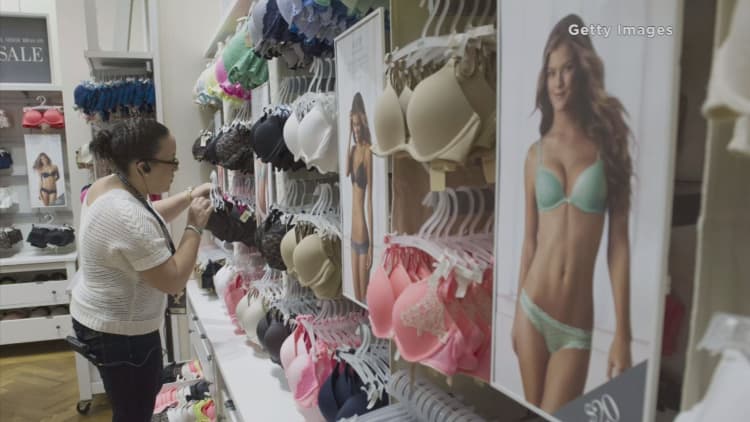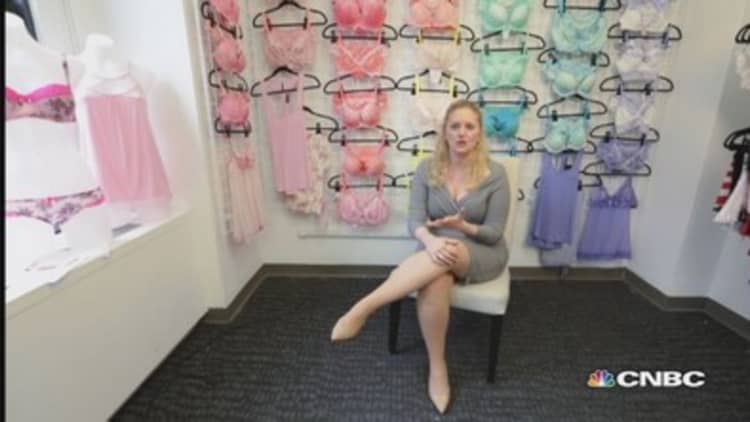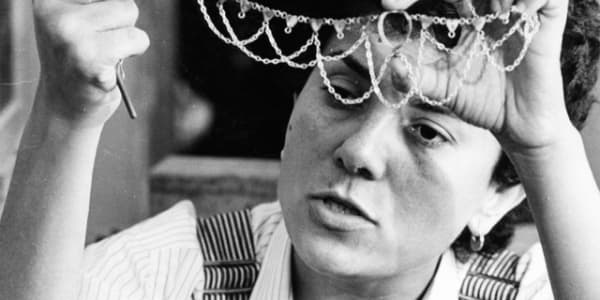As Michelle Cordeiro Grant grew up, she thought she had to be a doctor or a lawyer. As a daughter of Indian immigrants, it seemed like the right path to success.
But a job at Victoria's Secret changed not only her career path, but also her idea of what it means to be a woman. Now, she's the founder and CEO of a fast-rising lingerie brand that's taking on her former employer.
"I started to ponder on the idea of, what if you took the power of brand and leverage that to build a community - a community of women," Grant said, "where now we're actually talking about the things we want to do, and we're supporting each other to go after those ideas and those crazy things that we call dreams. What could happen with the world if women actually lived to their full potential versus living in the safe zone? And that's kind of where Lively came from."

Lively was founded by Grant in April 2016, and has been growing ever since — with its latest move its partnership with Nordstrom this year. The brand hones in on female positivity, using comfortable bras and activewear to get there— combining lingerie and leisure to pen the term "leisurée."
Every bra from the brand is $35 and includes items such as t-shirt bras, bralettes, push-ups and strapless styles. Seventy percent of their pieces are wire-free, and sizes range from 32A to 40DD. But Cordeiro knows not all women fall within this range and says more sizes will come as the company perfects more products.
Lively's success comes as companies, once seen as leaders in lingerie, begin to fall in popularity. In August, shares of L Brands, which owns lingerie giant Victoria's Secret, were down more than 10 percent to $28.66 a share, trading at lows not seen since 2011. To date, the company is down 33 percent for the year, largely due to a spike in inclusivity and an appeal to all sizes, which L Brands has failed to keep up with.
In contrast, Lively has found its niche and is booming — growing by 300 percent in 2017 and expecting to see triple-digit gains again for 2018. And while the company does not publicly disclose its earnings, Forbes estimates that Lively has netted more than $10 million within the last year.
Lively is making its name known in the lingerie space – a $7 billion market – by not only selling products catered to bodies of all shapes and sizes, but also creating events and experiences for its consumers to participate in. The brand's partnership with Nordstrom this year helped solidify that approach and further establish the company's footing in the market.
The brand announced its partnership with Nordstrom in September, where its products are available on the retail giant's website and in 11 of its locations, including stores in San Diego, Los Angeles, Chicago, Dallas and Seattle. Grant said the partnership is helping Lively "understand which markets to go towards" by feeling out a department store space.
"Two years ago they [Nordstrom] asked us to partner with them, and we said no, because we really wanted to make sure our brand was cohesive and that the experience was always consistent," Grant said.

"So we knew that it was too soon to partner with anyone in a wholesale environment," she added. "But they spent the last year and a half getting to know us and understanding what's important to us and our core values, and so they partnered and designed and helped build with us Lively experiences right near the escalators that really show the identity of who we are."
This comes as companies, once seen as leaders in lingerie, begin to fall in popularity. In August, shares of L Brands, which owns Victoria's Secret, were down more than 10 percent to $28.66 a share, trading at lows not seen since 2011, CNBC reported. The decline is largely due to a spike in inclusivity and an appeal to all sizes, which L Brands has failed to keep up with.
In contrast, Lively grew by 300 percent in 2017 and expects to see triple-digit gains again for 2018. And while the company does not publicly disclose its earnings, Forbes estimates that Lively has netted more than $10 million within the last year.
The making of an entrepreneur
But Grant wasn't always interested in retail, and pursued internships in finance before wanting something more from the field.
"I started to realize that working on something intangible wasn't giving me the drive and the passion I wanted from a career, and I ended up meeting someone at Federated [Merchandising Group] who hired me into their training program," she said. "We created products and labels for Macy's and Bloomingdale's for their in-house brands, and I was immediately fascinated by the idea of being involved in something that started with concept and ended up on a customer."
After a stint as a product assistant, she then made her way to VF Corporation and launched brands like Nautica and Kipling in the United States until she was recruited by Victoria's Secret and worked on the digital side of a brand as a director and senior merchant.
"I instantly realized this is where I belong, where I can control and be a part of the storytelling and how the brand is portrayed," Grant said. "And Les Wexner, the CEO of Limited Brands, was probably one of the most amazing teachers I could've had. He shared with me the power of brand - more importantly the power of brand cohesiveness."
But after five years, Grant felt separated from the billion-dollar company and could no longer connect to its products. Sales of women's bras in the U.S. held steady at nearly $7 billion last year, according to NPD Group, but Grant felt the industry wasn't doing enough to cater to customers of different sizes.
"I realized that I was no longer a customer for that brand," she said. "So while I loved it from a professional point-of-view, as a consumer I didn't relate. I didn't like the product, and I started to realize that I was marketing something where it's like 'everyone aspire to be Candice Swanepoel,' and I wasn't comfortable with the fact that I would never be Candice Swanepoel and I couldn't relate to that."
Using what Wexner taught her, Grant left the company and created Lively in 2016, aiming to create a new culture around lingerie. She started from the ground up and called on skills from her previous positions to guide her. But finding startup capital was difficult.
More from The Business of Design:
Zero-waste stores pop up in the U.S.
Jimmy Choo co-founder reimagines the shoe industry
"The scarier part was the funding," she said, "but I was very focused on the fact that I needed my first investor to be a supplier, because if the supplier is invested in my idea, they're going to help me fund a factory, perhaps, and be a foundation I need to launch this company the way that I see it is necessary."
By luck, Grant encountered the CEO of Gelmart International, the largest privately held intimate apparel maker in the world, and began the collaboration necessary to launch her business. Gelmart became Lively's founding investor and manufacturing partner, giving it the means to go to market.
Since then, the brand has raised $15 million in three rounds of funding from three main investors: Gelmart, GGV Capital, which has also backed Airbnb and Slack, and former CEO and Chairman of Nautica Harvey Sanders.
Grant met Sanders during her time at VF Corporation. Watching him create Nautica and serve on the board of UnderArmour pre-IPO, she was able to learn how to build a brand from the ground up and calls him a "mentor and partner as to seeing the different types of ways a company can grow."
Within 45 days of its launch, Lively shipped to every state in the country, selling its products exclusively online. In July, it opened its flagship store in New York City and is continuing to see a positive ROI.
The game plan
But even with L Brands' downward trend, how does Lively plan to compete against the well-established giant, which owns Victoria's Secret and PINK, or other direct-to-consumer brands like ThirdLove and AdoreMe?
The answer is letting her customers create the brand.
"We're focused on not building our brands ourselves," Grant said. "We build the brand with the community. We leverage the relevance of social media and the impact that consumers want to have on the things that they buy. And now you're flipping the conversation so that it's not us telling consumers what they should buy, but consumers are telling us what we should make for them to buy."
Through outlets like pop-ups, brick-and-mortar stores and Nordstrom, Grant said Lively is able to provide more than just lingerie. But the company also provides a positive environment, creating spaces where like-minded women can network and share an experience together.
Experiences like these have led to great success in the growth of the company, and often create reoccurring customers of the brand, Grant told CNBC.
"We thought the events were going to be marketing machines and we were going to drive impressions, but we would take it on the chin in terms of ROI," Grant said. "But it was quite the opposite. The ROI was positive pretty much instantly, and we would see our digital transactions in cities like Dallas increase by 175 percent, and the state of Texas by 80 percent, in a two-week window of having a pop-up there."
After seeing growth in Dallas and Nashville, the brand decided to open the Lively Experience Store in Manhattan, where it continues to succeed and host events that women care about, like succulent planting, spin classes and happy hours. Customers can also schedule a "fit sesh" and find their most accurate bra size.
Social media is also to thank for the brand's success. Lively launched its Instagram campaign in February of 2016, hand-picking 75 ambassadors to launch with the brand that April. To date, the brand has 50,000 ambassadors and 122,000 followers on the social platform.
After expanding into Nordstrom and launching its first brick-and-mortar store, Grant said the brand is strategically considering its next steps, which includes a beta with J.Crew-owned Madewell and its Labels We Love section, as well as another store in Dallas, Los Angeles or Chicago.
Grant has a message for young entrepreneurs seeking to duplicate her success.
"Just don't fear the unknown," she said. "Because, honestly, most of us entrepreneurs don't know what we're going to do next, and once you realize that you're not supposed to have all the answers, the fun of it all is figuring it out. When I was leaving my job at a Fortune 500 company, my husband and I sat down and we said 'What's the worst case scenario?' The worst case scenario is that I go back to eating Ramen noodles for a year or two and I start over - and I'm okay with that."




